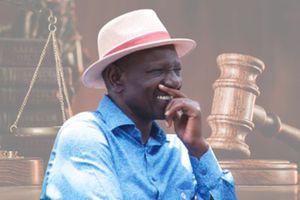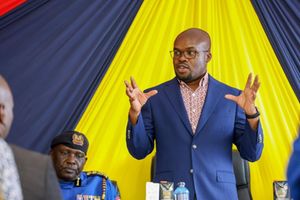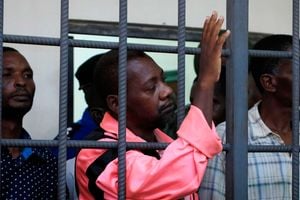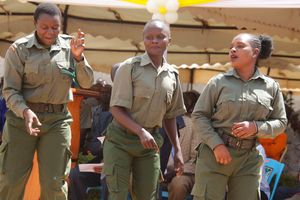
President William Ruto during the commissioning parade of 309 cadets at the Kenya Military Academy in Lanet, Nakuru County on April 16, 2025.
Since he was sworn-in to office on September 13, 2022, President William Ruto has formed at least 10 task forces on various national issues with specific mandates.
While some of the task forces have concluded their work and presented reports, others have aborted midstream or not sat at all, after being blocked by the courts.
Notably, some of those that have concluded their work have seen their reports successfully challenged in court with the most recent being the taskforce on police and prison reforms chaired by immediate former Chief Justice David Maraga.
City lawyer David Ochami says that while it is loss of public funds for the reports and taskforces that were declared illegal, in many instances, the outcomes of these teams are premeditated.
“This premeditation is done to coincide with the motives and interests of the appointing authority as they rarely disappoint or upset their masters. Therefore, they are a waste of time and money,” says Mr Ochami.
He argues that the Executive has often used taskforces “to delay and procrastinate over an issue that has an obvious and known answer or even secure financial opportunities to cronies”.
The 18-member team on police and prison reforms whose report was last week declared unconstitutional by the High Court, was created on December 21, 2022 through a gazette notice and in October 2023, it presented its report to President Ruto at State House.
“The decision by the President to establish the taskforce on the improvement of terms and conditions and to confer upon it specific roles that fall under the mandate of the National Police Service is unconstitutional, null and void,” Justice Lawrence Mugambi ruled.
Some of the taskforces have also had their proposals opposed by Kenyans and successfully challenged in court as unworkable and illegal. One notable example is the taskforce on controversial University Funding Model. Still others have cases pending in court.
One of the latest taskforces, whose work is on-going, was created on January 10, 2025 to investigate Gender-Based Violence (GBV) and femicide-related cases. The taskforce is chaired by former Deputy Chief Justice Dr Nancy Barasa.
The femicide taskforce is mandated to assess, review and recommend measures to strengthen the institutional, legal and policy response to GBV and femicide in the country.
Despite the court judgements and Kenyans’ scepticism towards taskforces, Mr Munyori Buku, the head of Presidential Communications Unit (PCU) is of a different opinion. He has previously dismissed those opposed to the taskforces, noting that every entity appointed by the president has served a purpose.
“I can tell you that the government is implementing all the reports presented by the taskforces as mandated,” said Mr Buku. “It’s because of the report on education reforms that the subjects were reduced as the government embarked on publishing new books based on the recommendations of the taskforce.”
But even as Mr Buku pushed back, Mr Ochami says that task forces in Kenya historically serve the political expediency of the Executive “and not the utilitarian needs of the governed.”
Mr Ochami says that taskforces are not required as they duplicate the functions of various institutions.
“There's no purpose in creating a taskforce to probe GBV or femicide, for instance, when the Directorate of Criminal Investigations can do it,” said Mr Ochami.
The low-trust levels towards taskforces could be informed by decades of reports by such teams gathering dust in government shelves without implementing their recommendations.
Former Mbeere MP Mutava Musyimi, appointed on May 5, 2023 to lead a 15-member presidential taskforce on the review of the legal and regulatory framework governing religious organisations in Kenya, admitted that its report has not been acted on almost a year later.
“We submitted our report to the president with specific recommendations on July 30, 2024 but nothing has happened to it so far,” Rev Musyimi told Nation.
But Mr Buku said that the government is implementing the report despite noting that it was disowned by members of Rev Mutava’s team.
The taskforce was to identify legal, institutional and governance challenges and gaps that have allowed or may allow religious extremist organisations, sects, cults, and other similar outfits to engage in practices detrimental to individual health and safety, the public interest or national values.
It was also tasked to formulate proposals on the legal, institutional, and governance changes required to prevent religious extremist organisations in Kenya from committing or fostering actions that are detrimental to individual health and safety, the public interest or to national values.
On September 30, 2022, weeks after he was sworn-in, President Ruto established a 42-member working party on education reforms led by Prof Raphael Munavu to look into basic education that included a summative evaluation of the Competence Based Curriculum (CBC), tertiary and university education issues.
The taskforce presented its report to the president in August 2023 but is yet to be fully implemented.
The Maraga team recommended various measures on improvement of the terms and conditions of service and other reforms for the police and prison officers.
The taskforce was tasked to identify legal, policy, administrative, institutional and operational constraints on effective service delivery by the police and the prison officers, review and recommend improvement of the terms and conditions of service and recommend improvement of their welfare.
The court has since declared it unconstitutional.
An eight-member commission of inquiry into the Shakahola tragedy was constituted on May 5, 2023 with Court of Appeal Judge Jessie Lessit appointed as Chairperson.
However, the commission was declared illegal by the High Court even before it could start its work.
The team had been tasked to inquire into the matter of the deaths, torture, inhumane and degrading treatment of members and other persons linked to the Good News International Church in Kilifi County.
It was also to establish circumstances under which the deaths, torture, inhumane and degrading treatment occurred and inquire into the legal, institutional, administrative, security, and intelligence lapses that may have contributed to the occurrence of the Shakahola tragedy among others.
Yet another team, the human resources for health taskforce domiciled at the Ministry of Health, was challenged with the matter still pending in court.
The taskforce was created on July 5, 2024 to identify the legal, policy, administrative and operational constraints impeding performance of the Health sector in Kenya.
It was also tasked with identifying and recommending legal, policy, administrative, institutional and operational Human Resources for health reforms in Kenya as well as review performance of human resources for health (HRH) and recommend improvements.
On July 5, 2024, the president created a taskforce on forensic audit of public debt, which is a mandate of the Office of the Auditor-General as provided in the constitution.
Article 229 (4) (g) of the constitution specifically states that within six months after the end of each financial year, the Auditor-General shall audit and report to parliament, in respect of that financial year, on the public debt.
The taskforce was, however, stopped by the High Court before it could start work. This followed a case filed by the Law Society of Kenya (LSK), whose president Ms Faith Odhiambo had been appointed a member of the taskforce that was to be chaired by Ms Nancy Onyango.
The team was to reconcile the proceeds of loans with the requisite appropriation for which it was intended, reconcile the loan servicing or repayments with the attendant terms of the facility based on the relevant context and the terms of the loans.
It was also to assess whether the country obtained value for money in terms of the terms of the loan, cost of the projects financed and the return on investment among others.
The National Working Committee on review of the new University Education funding model was created on September 16, 2024 and was led by Prof Japheth Ntiba. Its recommendations were quashed by the High Court for want of public participation.
And on May 17, 2024, a gazette notice issued by Head of Public Service Mr Felix Kosgey announced that Gen Charles Kahariri, the Chief of Defense Forces (CDF) would chair the presidential taskforce on the development of Kenya home of human origins Museum and Science Park in the Lake Turkana basin.
The taskforce was previously chaired by Gen Ogola, CDF, before his death in a plane crash last year. On March 28, 2025, Mr Kosgey announced the extension of its mandate for three months. The taskforce was to conclude its mandate on March 16, 2025.
Comprehensive review
“It is notified for general information of the public that the Chief of Staff and Head of the Public Service has extended the term of the taskforce for a further period of three months, with effect from the 16th March, 2025,” the notice read.
The President, through National Treasury Cabinet Secretary John Mbadi, in a gazette notice of March 31, 2025, also extended the mandate of the pending bills verification committee chaired by immediate former Auditor-General Edward Ouko for another six months. The team appointed in 2023 was required to conclude work on October 1, 2024.
There is also the national lottery taskforce that was appointed on February 17, 2023 with Mr Gideon Thuranira as its chairperson.
Its mandate included to undertake a comprehensive review of the best practices on the establishment of national lotteries in other jurisdictions, to develop the policy and implementation plan that will guide the establishment and operationalization of the National Lottery in Kenya.
It was also tasked with facilitating the necessary consultations “with all key stakeholders in the country” on the establishment of a National Lottery as well as examine the existing administrative, institutional, policy, and legislative structures and systems in the betting and gaming industry among others.











